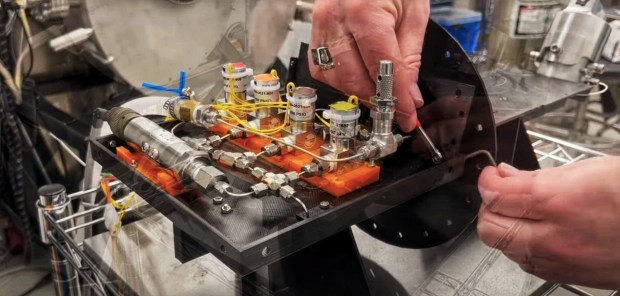Next time you hear someone question the compatibility of faith and science, you can point them in the direction of Jesuit Brother Bob Macke.
His work as a Vatican astronomer is playing a key role in space exploration. In fact, he designed a custom device for studying asteroid samples, lending a hand to a NASA mission when it was most in need.
The story starts three years ago, when the OSIRIS-Rex mission reached Bennu, an asteroid that is a bit wider than the height of the Empire State Building (or about 1/3 of a mile in diameter). Bennu’s surface composition stunned NASA scientists. According to a NASA report:
The spacecraft would have sunk into Bennu had it not fired its thrusters to back away immediately after it grabbed dust and rock from the asteroid’s surface.
It turns out that the particles making up Bennu’s exterior are so loosely packed and lightly bound to each other that if a person were to step onto Bennu they would feel very little resistance, as if stepping into a pit of plastic balls in a popular play area for kids.

In need of a special machine
The mission was heading back to earth with its precious rock and dust sample. NASA needed the right kind of machine to study it, something called a pycnometer. Sounds simple enough, right?
However, other space agencies had tried and failed to get this key data when previous asteroid samples returned to earth.
Complicating matters, the pycnometer had to be made to order without any motors, computers or circuitry, to avoid contaminating the asteroid sample. Unfortunately, the companies that build high-tech pycnometers weren’t willing to custom make this unique device.

A Jesuit scientist to the rescue
Brother Macke, known to most people as Brother Bob, is a scientist with a doctorate in physics and is also an expert on meteorites. His 2010 dissertation analyzing over 1,000 meteorites is cited often by other scientists.
You can read more of his story in this informative Mashable article, and follow his YouTube channel, Macke MakerSpace.
The Vatican Observatory was founded in 1891. Its observatory is located in Castel Gandolfo, better known as the summer home of popes. It also runs the Vatican Advanced Technology Telescope in Arizona.
“I see no conflict between faith and science,” Macke told Mashable. “There are people who interpret scripture literally, and that's not doing scripture justice.”
As Vatican astronomer and curator of the observatory's extensive meteorite collection, Macke is one of the few scientists who possessed the technical know-how to put together the custom pycnometer.
A happy landing
In recent days, OSIRIS-Rex's sample capsule successfully returned to Earth. Macke has left Rome for Johnson Space Center in Houston to be on hand to study the historic asteroid sample.

The sample will be unveiled October 11 at a live streamed news conference.
Brother Macke will continue to make key contributions to the understanding of the asteroid Bennu's surface composition, and thereby help scientists better understand the solar system's history.
His work unites scientific reason with awe at creation, revealing the good that a powerful intellect can do in the service of God.
Here is a video from the Macke MakerSpace channel, in which Brother Bob demonstrates his pycnometer device:










